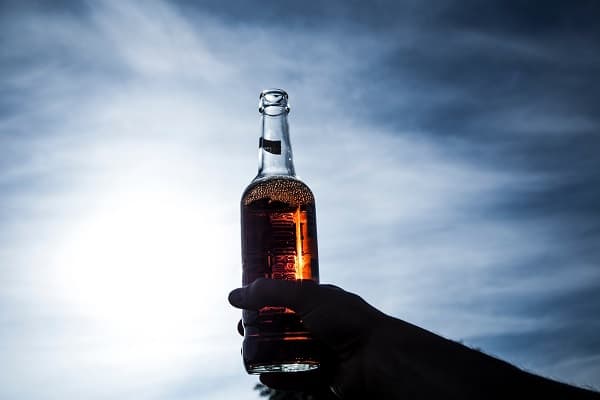cold turkey
INFORMAL noun
- the abrupt and complete cessation of taking a drug to which one is addicted. “I had to go cold turkey“
adverb: NORTH AMERICAN
- in a sudden and abrupt manner. “I had to quit drinking cold turkey“
If you or a family member, or a loved one, or if, even, a friend is considering going “cold turkey” as the means to finally quit drinking, our clear advice is to think again. Seriously, think again. Change your mind or change theirs.

The abrupt withdrawal someone undergoes from excessive alcohol consumption is not only dangerous – it has been proven to be possibly fatal. Take the tragic case of “True Blood” actor and star, Nelsan Ellis. Nelsan Ellis had it all, or so you would have thought. True Blood was a smash hit for television broadcaster HBO, and Nelsan Ellis was winning numerous awards for his supporting role as Lafayette Reynolds, a part-time short-order cook, and part-time drug dealer. The show ran from 2008 to 2014, and undoubtedly led to him landing the role of the famous Martin Luther King, Jr. in the 2013 film “The Butler.” To all intents and purposes, Ellis was approaching the pinnacle of his career. However, behind the various screen personas, Ellis was a troubled man, made all the worse by his addiction to alcohol. Along with his siblings, he was raised as a ward of state – his mother, divorced and a single parent, was struck down by severe depression after the death of her brother. Ellis struggled himself, having been diagnosed with dyslexia from 2nd grade. Ellis had attempted to get well many times in rehab but to no avail. In desperation, he finally decided on a highly dangerous course of action – to go “cold turkey” in a bid to bring his alcoholism to an end. Having attended alcohol detox and rehab, Ellis surely would have known the risks associated with attempting such a thing without supervision, medical or otherwise.
“Get the help you need today. We offer outpatient assistance, so you can maintain your work, family, and life commitments while getting the help you deserve!”
With great sadness, Ellis’s father later released an official statement – Nelsan Ellis, his son, had died from heart failure in a New York hospital, brought on by complications during his withdrawal from alcohol. He was 39 years old. “Nelsan was ashamed of his addiction and thus was reluctant to talk about it during his life,” the statement read. “His family, however, believes that in death he would want his life to serve as a cautionary tale in an attempt to help others.”Ellis was clearly suffering from alcohol use disorder (AUD), more commonly known as alcoholism. Having not found the recovery he so clearly needed and wanted in the various drug rehab facilities he attended, Ellis took, as it would later prove, desperate and drastic action, and it ended up costing him his life.

What is Alcohol Use Disorder (AUD)?
AUD is chronic, relapsing brain disorder, and is medically diagnosed by the simple criteria set out in the “Diagnostic and Statistical Manual of Mental Disorders, 5th Edition (DSM-5)”: “Alcohol is often taken in larger amounts or over a longer period than was intended.” According to a medical research study published in 2014, 1 in 3 U.S. adults drink alcohol excessively (many of these are binge drinkers), and so put themselves at high risk of developing AUD. Furthermore, the same study found that alcohol is the 7th. leading cause of death worldwide yet is the leading cause among 15 to 49-year-olds.
U.S. Alcohol Abuse Statistics
It was also reported that excessive drinking, binge drinking, and alcohol dependence (AUDs) in the U.S. were most common among men, particularly those aged 18 to 24. The prevalence of a diagnosed AUD was 10.2% among those who drank excessively, 10.5% for those who qualified as binge drinkers, and only 1.3% among non-binge drinkers. These figures clearly show the direct scientific link between binge drinking and the onset of AUD. The U.S. Centers for Disease Control and Prevention (CDC) reports that approximately 88,000 people a year die of alcohol-related causes – more than twice the number of people who die from opiate overdoses, which, along with opioids, is now considered a national epidemic. Additionally, every 50 minutes, a person dies in a DUI-related motor vehicle accident in the U.S. That’s 29 people every single day.
Idaho Alcohol Abuse Statistics
According to survey data covering the period from 2009-2013:
- 5% of Idahoans age 12 or older abuse or are dependent upon alcohol – that’s nearly 100,000 people
- Around 73,000 Idaho adults (9%) reported drinking excessively during the previous 30 days
- In 2009, 4,246 people were in addiction treatment on any given day in Idaho, but by 2013, that number had risen sharply to 6,619 – that’s an increase of 56%
- Of that 6,619, only 3% were admitted for alcohol use only – however, 60.6% were in treatment for both drug and alcohol abuse
- During 2009-2013, over 93% of Idahoans with an AUD did not receive treatment
“We treat both addiction and co-occurring disorders and accept many health insurance plans. Take a look at our outpatient program today!”
Alcoholism in Idaho State vs U.S.: Official Statistics
Using official information taken from the 2011 and 2012 National Survey of Drug Use & Health data reports, Idaho state has a slightly higher overall rate of alcohol use disorder per capita (3.16%) than the U.S. average (3.15%):
| Idaho state | United States | ||
| Age range: | % per capita: | Age range: | % per capita: |
| 12-17 | 1.33% | 12-17 | 1.34% |
| 18-25 | 5.32% | 18-25 | 6.01% |
| 26+ | 3.05% | 26+ | 2.90% |
Alcohol Withdrawal Symptoms
Excessive alcohol consumption, if allowed to continue unabated, will alter your brain chemistry, and so will lead to the build-up of a level of tolerance. Over time, if you wish to achieve the same effect that alcohol previously gave you, you will need to increase your already excessive consumption. This can lead to problems should you decide to quit your drinking abruptly. The following alcohol withdrawal symptoms can be experienced by mild drinkers who decide to quit abruptly. Additionally, if you have ever experienced a hangover the “morning after” from drinking too much alcohol, you can also experience these. AUD sufferers, however, will quickly experience withdrawal symptoms should they abruptly stop their drinking (the cold turkey scenario) or attempt to even cut down. Potential alcohol withdrawal symptoms include:
- Difficulty sleeping
- Irritability and restlessness
- Shaking and tremors
- Muscle weakness and fatigue
- Headache
- Dizziness
- Nausea and vomiting
- Diarrhea
- Loss of appetite
- Sweating
- Rapid heart rate
- Cognitive difficulties
- Short-term memory lapses
- Anxiety and/or depression
- Aggression or hostility toward others

More Serious Alcohol Withdrawal Symptoms
Should you decide to quit your drinking by going cold turkey, you will seriously increase the severity of your withdrawal symptoms, and so put yourself at risk of death – just like Nelsan Ellis. Severe cases of alcohol withdrawal may result in a condition known as alcohol withdrawal syndrome (AWS), which results in shaking, headache, high blood pressure, anxiety, and tachycardia (increased heart rate), and also delirium tremens (or DTs), which can lead to fever, seizures, paranoia, and hallucinations, and, in extreme cases, coma and even death. In addition to the withdrawal symptoms described above, it is important to remember that alcohol is a depressant – it slows or lowers the functioning of the central nervous system. This is exactly why alcohol withdrawal can be fatal because the brain and central nervous system experience a “rebound” after being continually suppressed by alcohol for an extended period of time. Therefore, the sudden removal of the central nervous system depressant (alcohol) can be life-threatening. Therefore, your body is less able to withstand severe reactions to withdrawal, such as AWS and DTs, and both of these conditions require urgent medical assistance. Other serious conditions associated with severe alcohol withdrawal include:
- Low electrolyte levels can lead to rapid cardiac complications, including arrhythmias and sudden death resulting from a heart attack
- Hypophosphatemia (low levels of phosphate) can lead to muscle weakness, coma, and the cessation of normal breathing functions
- Alcoholic ketoacidosis is a potentially fatal condition (but it is treatable), and is similar to that experienced by individuals with type 1 diabetes mellitus
- Alcohol abuse will lead to a deficiency of thiamine (vitamin B1) in the body, which, according to the National Institute on Alcohol Abuse and Alcoholism (NIAAA), the vast majority (up to 80%) of people with an AUD suffer from. This can lead to:
-
- Wernicke’s encephalopathy, a disorder defined by significant mental confusion, loss of control over eye movement, and a lack of motor coordination. This, in turn, can lead to:
Korsakoff syndrome, where people have problems with forming new memories, learning, and confusion. Furthermore, Korsakoff syndrome will result in confabulation (when a person “makes up” information to fill in memory gaps). The syndrome is a serious disorder, requiring specialized treatment – only 25% of sufferers will fully recover.
The Stages of Severe Alcohol Withdrawal: Timeline
If you are suffering from an AUD, the alcohol withdrawal side effects and symptoms can be broken down into three stages:
- Stage 1: Beginning 8 hours after your last drink, and characterized by anxiety, tremors, insomnia, nausea, and abdominal pain
- Stage 2: Beginning 14-72 hours after your last drink, and characterized by high blood pressure, increased body temperature, unusual heart rate, and confusion
- Stage 3: Beginning 2-4 days after your last drink, and characterized by hallucinations, fever, seizures, and severe agitation
“We accept many health insurance plans. You can get your life back in order with our outpatient program today!”
Alcohol Withdrawal: The Unknown Variables
Alcohol withdrawal is a highly variable experience, so the severity of alcohol withdrawal symptoms experienced will vary greatly from person to person. However, there are certain factors that will affect that severity. For example:
- Family genetics
- Family history of addiction
- Childhood trauma
- Stress levels
- Your own medical history
- The presence of a co-occurring mental health disorder
- Actual consumption levels
- Length of time drinking
- Amount consumed each time
IMPORTANT: As a general rule of thumb to be applied, the more alcohol-dependent you are, the more severe your withdrawal will be. However, anyone considering going cold turkey in an attempt to quit their drinking (whatever their consumption) is strongly advised to seek the guidance of a professional medical practitioner first.
What Happens During a Professional Medically-Assisted Alcohol Detox?
Alcohol detox is the process of detoxifying your body from the toxins created by the use of alcohol, and to safely manage the withdrawal symptoms that you may experience. The detox process is aimed at the physical side of alcohol withdrawal and is not to be confused with rehabilitation, which predominantly treats the psychological effects of alcohol use. Excessive alcohol consumption over an extended period of time has a profound effect on the body, and, in particular, the brain. Alcohol (or, more correctly, ethanol) is responsible for releasing large amounts of happy and calming chemicals in the brain, such as dopamine. This causes the brain to attempt to counteract these chemicals, by the abnormal overuse of neurotransmitters – the same chemicals that cause anxiety, pain, and excitement. When you quit drinking, the brain’s compensation techniques will cause acute problems, as there are now too many of these neurotransmitters, with no dopamine to counteract them. This is why people experience withdrawal symptoms.
Alcohol Detox: The Process
The first step of professional alcohol detox is the management and monitoring of your physical symptoms of withdrawal, as detailed above. The use of medication is available to ease the more severe symptoms, such as nausea, dehydration, seizures, and insomnia. During the process, your body’s central nervous system is highly overactive, so medications such as benzodiazepines are used as the body attempts to restore a healthier balance. Additionally, your blood pressure, heart rate, respiration, and body temperature are all closely monitored, and the professional medical staff on hand will ensure that they remain at safe levels.
What Medications Are Used During Alcohol Detox?
There are a number of medications that can be prescribed to soothe the symptoms of alcohol withdrawal and to assist in helping your body’s physical recovery process. These include:
- Naltrexone: Reduces alcohol cravings, as well as reducing the pleasure derived from consuming alcohol
- Benzodiazepines: Reduces the severity of withdrawal by calming the patient
- Acamprosate: Reduces the more acute symptoms of alcohol withdrawal, as well as reducing alcohol cravings
- Disulfiram: Produces a severe nauseous reaction should alcohol be consumed; also more commonly known as Antabuse.
Those suffering from alcohol abuse will often be malnourished, so during the detox process, vitamins, supplements, and the implementation of a healthy diet and regular sleep schedule are also introduced to improve withdrawal side effects, and help the body heal faster. Additionally, fluids will also be given to prevent and reverse dehydration. On average, patients remain in detox for around 5-7 days, but the exact duration of detox is wholly dependent upon the history, needs, and progress of each individual. It is important to remember that alcohol detox is only the essential first step – it should be followed by a complete addiction treatment program, including behavioral therapy, counseling, participation in support groups, medication, and complementary therapies.

The Different Types of Professional Alcohol Detox
Outpatient Alcohol Detox
Offering several hours per week of treatment, outpatient rehab is often appropriate for functional alcoholics with work commitments or family obligations. It may not prove as successful for those with a serious AUD, however.
Intensive Outpatient Alcohol Detox
A step up from traditional outpatient therapy, intensive outpatient provides a more rigorous schedule of 12 hours per week of therapy or more. The patient continues to live at home and maintain daily obligations while receiving detox treatment almost every day.
Inpatient Alcohol Detox
Residential detox programs are provided at live-in facilities where patients sleep, eat, and receive treatment under constant supervision. While an inpatient treatment program is often the most expensive option, it may prove more successful for the severest AUDs.
Tapering Down Your Alcohol Intake
If you are advised by your medical practitioner that your current alcohol intake does not warrant a professional detox, they may advise you to taper down that intake as a way to negate or reduce any withdrawal symptoms. This tapering down process is seen to be normally much safer than just quitting alcohol cold turkey. Tapering off is standard medical practice for other types of drugs, such as antidepressants. Patients taking these are not taken off their medication abruptly but will have their dosages gradually reduced over time. However, when it comes to alcohol, there is little, if any, research that shows that tapering off process actually reduces the alcohol withdrawal symptoms, let alone reduces an individual’s long-term levels of consumption.
Lastly…
Nelsan Ellis’s story clearly demonstrates one important point. As tragic as that story is, it was only when he was rushed to the New York hospital’s Emergency Room was medical advice and treatment sought. Sadly for him, in other words, way too late. Our advice is equally clear. If you wish to stop or reduce your alcohol consumption, please seek medical guidance from your family practitioner on how to proceed. They are far better placed than yourself to decide how best you can stop or reduce your alcohol consumption – safely and effectively.

